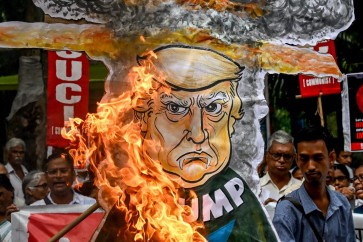Popular Reads
Top Results
Can't find what you're looking for?
View all search resultsPopular Reads
Top Results
Can't find what you're looking for?
View all search resultsPreventing Pandora’s Box from opening on nuclear testing
A return to nuclear explosive testing by the United States has the potential to open the doors for others to follow suit to “perfect” their nuclear arsenals.
Change text size
Gift Premium Articles
to Anyone
U
nited States President Donald Trump’s recent pronouncement on social media that the US would resume nuclear testing has the potential to sow confusion among both allies and adversaries. Uncertainty prevails whether this entails nuclear explosive tests or non-explosive tests of delivery systems and possibly warhead components.
This notwithstanding, the Asia-Pacific, home to six of the nine nuclear armed nations and a region troubled by longstanding and unresolved tensions, is particularly vulnerable to any erosion of the currently prevailing norm against nuclear testing. A return to nuclear explosive testing by the US has the potential to open the doors for others to follow suit to “perfect” their nuclear arsenals, most of which have been built with a small number of tests compared to the US. This would be catastrophic not only for the Asia-Pacific but for the international community.
In early 2024, there were reports about the US, Russia and China increasing their readiness at their respective nuclear test sites. Any resumption of testing by Washington, therefore, will likely evoke a response from Moscow and Beijing.
As it stands, while the three of them have signed the Comprehensive Test Ban Treaty (CTBT), none have ratified it, since Russia too had suspended its ratification in 2024. Following the US example, Moscow and Beijing could likely follow similar paths. Beijing currently reportedly possesses a fraction of the nuclear warheads compared to Washington, 410 compared to over 3,700.
Like the US, China has signed but not ratified the Comprehensive Test Ban Treaty (CTBT). It could therefore also renege on this treaty obligation if Washington sets the wrong example. Renewed nuclear testing would provide a form of justification for Beijing to accelerate the increase in the quantity, efficacy and reliability of its presently smaller but already fast-growing stockpile and allow it to address any possible knowledge gaps borne from having conducted 45 tests compared to 1030 in Washington’s case.
The lead of the major powers will also possibly influence India and Pakistan who had conducted 5 and 6 explosive nuclear tests respectively in 1998. Neither has signed the CTBT, yet both have maintained a testing moratorium for over 25 years. Nuclear testing by the US would undermine the consensus underpinning this moratorium, which has the potential to destabilize the fragile South Asian nuclear balance and exacerbate tensions between the two nuclear-armed rivals.
North Korea is the only country to have tested nuclear weapons this century. Pyongyang has conducted six nuclear tests since 2006, the latest in 2017, and was met with international condemnation. The moral authority for this condemnation rests on the principle that nuclear testing is inherently destabilizing and illegitimate. If the US resumes testing again, this authority collapses. The prospect of another North Korean test is very high. Particularly as rumors have been circulating for several years that a test was imminent, with some positing that China has been exerting pressure on the North to refrain.



















